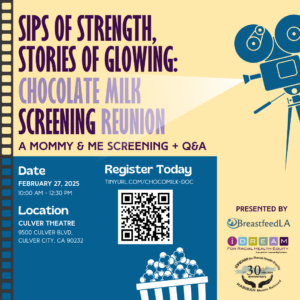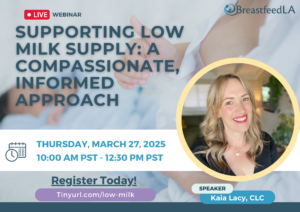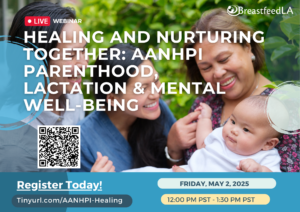
BreastfeedLA is thrilled to invite you, your organization, and your community to an exclusive screening and panel discussion of Chocolate Milk, a powerful documentary that explores Black maternal health, breastfeeding, and the systemic barriers that impact our communities on Thursday, February 27, from 10:00 AM to 12:30 PM.
Event Details & Registration
- Event Info: Click Here
- Reserve Your Spot: Register Now
Bringing little ones? Please RSVP for any children requiring seats.
Help amplify this important conversation! Please share this event with your friends, colleagues, clients, and community members who are passionate about maternal health and equity.
Seats are limited—RSVP today! We look forward to coming together for a morning of powerful storytelling, advocacy, and connection.
Looking forward to seeing you there!

Please join BreastfeedLA as we present, “Supporting Low Milk Supply: A Compassionate, Informed Approach”, with Kaia Lacy. This presentation explores common care approach challenges and offers an outline of supportive practices to help guide compassionate, informed interactions with parents navigating issues with milk production.
REGISTER TODAY!Objectives – Here’s what you’ll learn:
- To outline the emotional impacts of primary low milk supply (PLMS) and what barriers to adequate care exist for PLMS families and support providers.
- To provide actionable steps towards more informed and compassionate. care when supporting low milk supply
- To outline what differences benefit care approaches within primary vs secondary low milk supply intervention.
The recording of this event will be sent to all registrants 2 weeks after the live event, and available for viewing for up to 3 years after the live event.
Continuing Education
RN: BreastfeedLA is an approved provider by the California Board of Registered Nursing. This course offers 2.0 contact hours of continuing education. BreastfeedLA’s provider number is CEP 16435. Licensee must maintain certificate for a period of four years.
IBCLC: BreastfeedLA is an approved Long-Term Provider by the International Board of Lactation Consultant Examiners #CLT113-36. 2.0 L- CERPs will be awarded.
RDs & OTs: Maintain a copy of the agenda and certificate for CPEs for Professional Development Portfolio.

Join BreastfeedLA and AANHPI Lactation Collaborative for our LIVE webinar, “Healing and Nurturing Together: AANHPI Parenthood, Lactation & Mental Well-being,” on May 2 from 12:00 PM to 1:30 PM PT.
Pregnancy, postpartum, and lactation bring unique challenges that impact mental health, from navigating work transitions and family expectations to breastfeeding in public and during emergencies. Designed for both healthcare providers and community members, this webinar focuses on the experiences of the AANHPI community, offering practical strategies to support mental well-being while addressing real-life situations, including returning to work, managing family dynamics, and ensuring infant feeding during disasters. Join experts for a culturally responsive discussion on fostering resilience, advocating for supportive environments, and prioritizing mental health throughout the parenting journey.
REGISTER TODAY!Continuing Education
RN: BreastfeedLA is an approved provider by the California Board of Registered Nursing. This course offers 1.0 contact hours of continuing education. BreastfeedLA’s provider number is CEP 16435. Licensee must maintain certificate for a period of four years.
IBCLC: BreastfeedLA is an approved Long-Term Provider by the International Board of Lactation Consultant Examiners #CLT113-36. 1.5 L- CERPs will be awarded.
RDs & OTs: Maintain a copy of the agenda and certificate for CPEs for Professional Development Portfolio.

Join BreastfeedLA for “Roots to Resilience: Empower, Heal, & Thrive”, a Mental Health and Wellness Self-Care Day dedicated to nurturing and uplifting our birthing people in honor of Mother’s Day. This event provides culturally responsive mental health support and practical self-care techniques to foster healing, resilience, and overall well-being.
Take Action for Yourself, Take Action for Others, Take Action for Your Community
- Take Action for Yourself – Engage in guided self-care activities such as meditation, journaling, and wellness discussions led by culturally responsive mental health professionals.
- Take Action for Others – Connect with a supportive community, share experiences, and learn how to recognize and address postpartum mood and anxiety symptoms that may impact breastfeeding.
- Take Action for Your Community – Gain access to local mental health resources and tools to foster ongoing wellness, helping to create a healthier future for families.
Why Attend?
✨ Learn strategies to support your mental and emotional well-being
✨ Decrease stigma and foster help-seeking behaviors
✨ Explore the connection between mental health and successful breast/chestfeeding
✨ Experience a safe and welcoming space to recharge and reconnect
This event is more than a day of self-care—it’s a movement toward resilience, empowerment, and healing. Join us in recharging your soul.
This event is free and open to all. We kindly ask that you RSVP to help us plan accordingly.
REGISTER TODAY!
